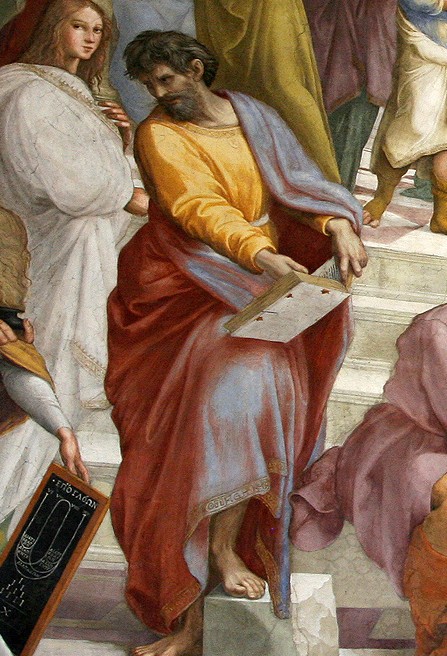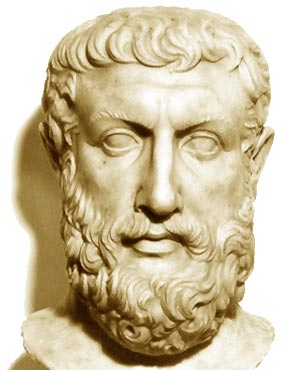If that title seems a bit vague, not to mention all-around weird, then there is probably a reason for that. The subject matter we are tackling today tends to be so head-scratchingly confusing that any attempt at explaining it via a brief title just falls short.

That’s right everybody. This week we are looking at one of those grand and profound questions that philosophy has blessed us with over the centuries; it’s one of those real nitty-gritty, what-does-it-all-mean sort of questions that tends to infuriate amateur philosophers and causes first year philosophy students to consider pursuing a degree in art history instead.
So…why does stuff exist? How did it get here? Did it come from nothing? Or did it always exist? We are going to get to all that in just one moment.
First, believe it or not, I actually do get quite a bit of reader mail. After my article a few weeks ago, I woke up to a flurry of emails in my inbox.
“Outstanding newsletter, thank you.”, read one such letter.
“Interesting stuff, keep it coming!”, read another.
Some of our readers turn out to be philosophers themselves and wasted no time in sharing their views.
“…Religion and metaphysics seek to understand the source of it all. Science said it all started with the Big Bang which created Space, Time, Energy and Matter, Location and such. Since there was no Space until the Big Bang- what did it go Bang in?
In religion they say it all started with God saying “Let there be light and there was light”. Since the word “let” is a request or command, who was he aiming that communication at?
Both explain how ‘something’ came into being. Since the laws of nature, God and physics say all words to exist must have its opposite. (check any thesaurus). SO the opposite of something is NOTHING. What NOTHING created all the somethings?”
An interesting idea, I think to myself. It is an idea, however, that is slightly flawed.
For starters, the Big Bang theory does not state that matter and energy suddenly appeared from nothingness. Rather, it tells us that the universe once existed in an incredibly dense state and then BANG, it rapidly expanded. As a cosmological theory, the Big Bang does not necessarily promote the idea that something (the universe) came from nothing (all physicists reading this should feel free to write in and correct me if I’ve made some unforgiveable mistake).
Ignoring the religious explanation for the creation of being, because I am simply not up for more theology this week, we are still left with that final, dangling question: What nothing created all the somethings?
Believe it or not, that is a question that has been puzzling philosophers for centuries, and it brings us back to our topic of the day: how does stuff come into existence?

This question of the origin of existence was of supreme importance to the Greek philosophers. There was perhaps no philosopher who better explained the confusion behind “coming into being” than Parmenides.
Parmenides of Elea was a pre-Socratic philosopher who lived either in the late sixth or early fifth century BC and is often considered to be the founder of the Elatic school of ancient philosophy.
Parmenides is best remembered for his critiques on change and motion. He makes the seemingly baffling claim that all matter is incapable of change. Moreover motion, insofar as it is a type of change, is also impossible. How exactly is change impossible? His argument goes something like this:
Change consists of coming into being (the philosophers used the Greek word, genesis). If something changes, comes into being, then it came into being from something else. What did it come into being from? There are only two options as far as Parmenides can see.
1. Being comes from nonbeing
2. Being comes from being
If #1 is correct, then it would tell us that being (existence) springs from nothingness. This is a logical impossibility since nothing can come from nothing (not even the Big Bang).
If #2 is correct and we conclude that being comes from being, then that would imply that there existed a state of non-being at one point. However, we know this to be impossible.
We cannot say that B came to exist from A, because that would imply that there was once a time that B partook of non-existence, and we have already shown that that which does not exists does not exist out of necessity and nothing can come from nothing.
Put very frankly, so long as a thing can be thought of or expressed, it can be said to exist. More importantly, it can be said that that thing ALWAYS existed and will always exist. Change is impossible and the entire universe is indivisible and eternal.
If this seems like a rather tricky argument, then that is because it is. It is an argument that would seem to contradict our own empirical observations, our perception that all things are changing all the time.
Our senses, according to Parmenides, are actually an illusion. The way of perception is the way of opinion, and only be adhering to strict rational thought can we arrive at the way of the truth, namely that all of existence is One and cannot partake of change.

The ideas of Parmenides would actually have implications for the field of ethics as well as philosophy. This “parmenidean problem” would be hijacked by some unscrupulous figures of ancient Greece and used to justify a relativistic view of morality and ethics.
The sophists, specifically Protagoras of Abdera, would make the claim that, since perception is illusion and only being truly exists, there was no true standard of goodness based on human nature.
Each idea is just as good as the next, both equally valid and invalid at the same time. In short, there is no standard for morality. Man is the measure of all things. The sophists would use these ideas while defending their plaintiffs in court or when teaching the subject of ethics and morality.
Men like Socrates, Plato, and Aristotle believed that an acceptance of ethical relativism was the worst thing that could happen to an individual. Philosophy ought to lead us to a better understanding of virtue, not deprive us of any standard with which to judge the goodness of our life.
To counteract the claims of the sophists, and to dispel some serious teleological, metaphysical, and even theological concerns, a proper counter argument must be made against Parmenides.
Enter Aristotle.
Aristotle lays out his argument against the Parmenidean problem in book 1, chapter 8 of his Physics. Aristotle first lays out the problem of change as expressed by Parmenides.
“What is cannot come to be (since it already is), while nothing can come to be from what is not.” –Aristotle (Physics)
To avoid the Pamenidean dilemma, the philosopher does something uniquely Aristotelian. He draws an important distinction.
And here we come back to our reader mail briefly. Our subscriber wrote into us suggesting that, perhaps, some thing comes to be from its opposite. And in a way, Aristotle agrees.
Change consists of a pair of contrasting or opposite properties and a subject that gains one property while losing another. Change consists of three things: an underlying subject, a form (a positive property), and a lack or privation of that form.
Aristotle uses the example of…
A. An unmusical man who becomes musical
B. A shapeless pile of bronze that becomes a statue.
In the case of A, the subject is the man, the

form is “musical” and the privation of the form is “unmusical”. In the case of B, the subject is “bronze”, the form is “statue” and the privation is “shapelessness”.
Change occurs when the privations (unmusical and shapelessness) are replaced by the forms “musical” and “statue”. Throughout this process, the subjects of “man” and “bronze” remain in existence. They simply partake of different accidental (non-essential) properties.
Parmenides might ask us, “Where did the musical man come from? From being or nonbeing?” Aristotle might respond that he came from both, and at the same time neither.
The unmusical man has a potential to become the musical man. However, until the privation of “unmusical” is destroyed and replaced with the form of “musical”, the musical man subsists in a state of potential existence, not actualized existence.
If this topic still seems a bit hazy, then don’t worry. It’s not necessarily the easiest topic to grasp. I would encourage you to write in and we can discuss it more. Until next time, keep philosophizing my friends. We will speak soon.
 That’s right everybody. This week we are looking at one of those grand and profound questions that philosophy has blessed us with over the centuries; it’s one of those real nitty-gritty, what-does-it-all-mean sort of questions that tends to infuriate amateur philosophers and causes first year philosophy students to consider pursuing a degree in art history instead.
That’s right everybody. This week we are looking at one of those grand and profound questions that philosophy has blessed us with over the centuries; it’s one of those real nitty-gritty, what-does-it-all-mean sort of questions that tends to infuriate amateur philosophers and causes first year philosophy students to consider pursuing a degree in art history instead.  This question of the origin of existence was of supreme importance to the Greek philosophers. There was perhaps no philosopher who better explained the confusion behind “coming into being” than Parmenides.
This question of the origin of existence was of supreme importance to the Greek philosophers. There was perhaps no philosopher who better explained the confusion behind “coming into being” than Parmenides.  The ideas of Parmenides would actually have implications for the field of ethics as well as philosophy. This “parmenidean problem” would be hijacked by some unscrupulous figures of ancient Greece and used to justify a relativistic view of morality and ethics.
The ideas of Parmenides would actually have implications for the field of ethics as well as philosophy. This “parmenidean problem” would be hijacked by some unscrupulous figures of ancient Greece and used to justify a relativistic view of morality and ethics.  form is “musical” and the privation of the form is “unmusical”. In the case of B, the subject is “bronze”, the form is “statue” and the privation is “shapelessness”.
form is “musical” and the privation of the form is “unmusical”. In the case of B, the subject is “bronze”, the form is “statue” and the privation is “shapelessness”. 








4 comments
On Parmenides, surely we can say that B came from A as it simply implies that B always had its existence as potential within A.
I have confused thoughts on the subject of opposites. We can measure heat, but can we measure cold except as a degree of absence of heat. Does hate exist as an opposite of love or is mild dislike just an absence of love to a mild degree and extreme hatred an absence of love to a great degree or are they opposite sides of a single coin?
Any illuminating thoughts would be welcomed by this very self educated and amateur philosopher.
On Protagorus, in defiance of Socrates, Plato and Aristotle if I may be so impudent, It is clear fact that that social mores vary from culture to culture and so then must views of what is right and what is wrong, what is acceptable behaviour and what is not. Surely then if a member of a culture lives a moral life according to that culture then they must be a moral person. If so Relativism must be alive and well unless we are so dogmatic (as we are) to maintain that any one culture has a monoply on morality.
To the comment above, I think the confusion comes when we apply our modern understanding of “change” to the Parmenidian problem. We might assume that A can change into B because we think B is simply a different, changed, version of A.
However, to Parmenides, change literally meant to create something new. He uses the Greek word “Genesis”. When something changes it ceases to be one thing and something else is created. Parmenides seems to be asking if A changed to B, where did A go? Did it go into nonexistence? Where was B before? Did it spring into existence from nonexistence? Certainly not!
Aristotle’s argument of opposites is a clever way of getting around this problem. He is saying that A does not disappear and B does not magically appear when change occurs. He is saying, instead, that a subject partakes of the quality A for a given time until it ceases to partake of quality A and partakes of quality B. In this way, the subject did not go anywhere (did not disappear into nonexistence) it is just partaking of different non-essential qualities.
The argument of opposites is pretty easy to spot in some forms of change (love to hate, dark to light, hot to cold). The tricky part is when we find objects that don’t have a clear opposite. If we are to believe the argument from opposites, then we should say that anything that can partake of change should have an opposite. What, then, is the opposite of a chair? Or a dog? Is the opposite of a dog a cat? Or is it a not-dog?
I know it seems like a silly question, but it’s one that has confused philosophers in the past.
With regard to ethics!
We have addressed this topic as well here:https://classicalwisdom.com/defense-aristotelian-ethics/
Basically, Aristotle makes the case that there are non-relative ethics. We can, in short, empirically and rationally conclude which virtues partake of goodness and which do not. There might be slight variations in the various cultures, but all peoples, Aristotle says, aim for the good and not necessarily tradition.
The author asserts that “the Big Bang does not necessarily promote the idea that something (the universe) came from nothing. . .”
Different scientists do have different specifics of their own particular versions, but Big Bang is paired with inflation theory. Most versions of string theory also include inflation.
A paper from 2003 shows that assuming that there was (and is inflation), then there must have been an actual, absolute beginning — that is, something did come from nothing (using the definition of nothing as “what rocks dream about”). This disproves the suggestions of some that maybe there always were scalar fields, inflaton fields, etc.
The paper was written by Arvind Borde, Alan Guth, and Alex Vilenkin. The paper, entitled “Inflationary spacetimes are not past-complete,” appeared in Physical Review Letters, vol. 90, p. 151301. Professor Guth is the father of inflation theory. Professor Vilenkin has written an excellent book, Many World’s in One (2006), that discusses this issue, among others.
I am embarrassed to admit that in my earlier Comment I misstated the title of the famous PRL paper by Borde, Guth & Vilenkin. The correct title of the paper is “Inflationary Spacetimes Are Incomplete in Past Directions.” Sorry about that. The volume and page numbers are correct as stated in my earlier Comment.
Trackbacks
Our apologies, you must be logged in to post a comment.